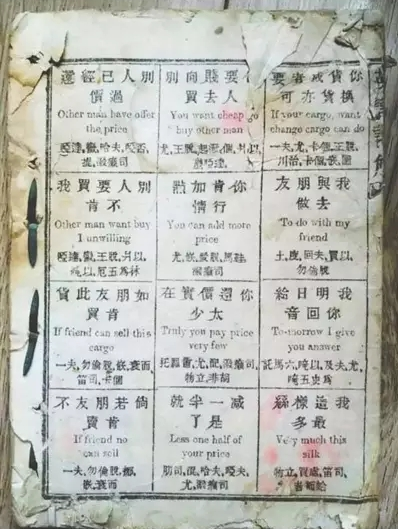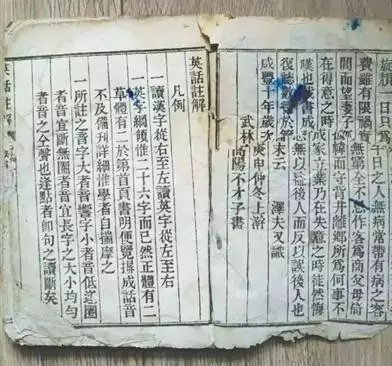English learners in China started using Chinese characters to help them pronounce the foreign language hundreds of years ago, according to Chinese media. In an old textbook owned by a collector in Chengdu, southwestern Sichuan province, the English sentences – most of them grammatically incorrect – have traditional Chinese characters as phonetic notations, the Chengdu Business Daily reported. A publishing date indicating “The 10th year of the Xianfeng Emperor”, or 1860, is printed on the book, according to the report.

Ghost Language
Experts who were
specialized in ancient books said they believed the textbook was genuine and
from the late Qing dynasty (1644-1911). English textbooks, mostly written
by Chinese authors, gained popularity in Chinese port cities during the 19th
century, according to the report. Some Cantonese-speaking Chinese at that
time called English “the ghost language”, the report said. During the Qing
dynasty, people in southern China often referred to foreigners as “ghosts”
because of their different appearance. “Gweilo”, which literally means “ghost
man”, is still a common term for Westerners in Hong Kong.
Ghost Language
Experts who were
specialized in ancient books said they believed the textbook was genuine and
from the late Qing dynasty (1644-1911). English textbooks, mostly written
by Chinese authors, gained popularity in Chinese port cities during the 19th
century, according to the report. Some Cantonese-speaking Chinese at that
time called English “the ghost language”, the report said. During the Qing
dynasty, people in southern China often referred to foreigners as “ghosts”
because of their different appearance. “Gweilo”, which literally means “ghost
man”, is still a common term for Westerners in Hong Kong.

How people in the 19th century learned English?
This English textbook
shows how people in the 19th century learned English pronunciation. Daily oral
English phrases, such as "Tomorrow I will give you an answer" and
"Less one half of your price" are seen in the antique book. The
book is printed with a note in Chinese characters meaning "Emperor
Xianfeng's 10th year of reign (1860)" and belongs to a Chengdu resident. "Unreadable
code" composed of Chinese characters can be seen under each English
sentence, which is thought to have been used to help the reader remember
English pronunciation. The corresponding Chinese meanings of each Chinese
sentence can be seen above it, and are in the original complex form that is
assumed to be written language in Qing Dynasty. The Chinese annotations
under English sentences seem funny and when read aloud, the nonstandard
pronunciation may still confuse foreigners.

The book's content is
divided into five categories covering geography, the monarch and his subjects,
teachers and friends, palaces and bureaus, as well as five metals. Each page
has 12 boxes, and each box offers one English sentence.
The book, with 40-50
pages, which turn over from left to right, was bought by a Mr Yao at an old
book market about seven years ago.
Experts from the
Western Sichuan Literature Repair Centers examined the book's printing and
typeface and said that the book is likely from the late Qing Dynasty, but
weren't sure of the specific year. History experts say that the phenomenon of
learning English pronunciation via Chinese annotations was quite common during
that time.

_______________________________________________________________
We, eGTCP, welcome you to
applying for GTCP(Great Tao credit purchasing card), you can get
$10,000 immediately, buy more, pay later, let's get started!
Follow us:










没有评论:
发表评论